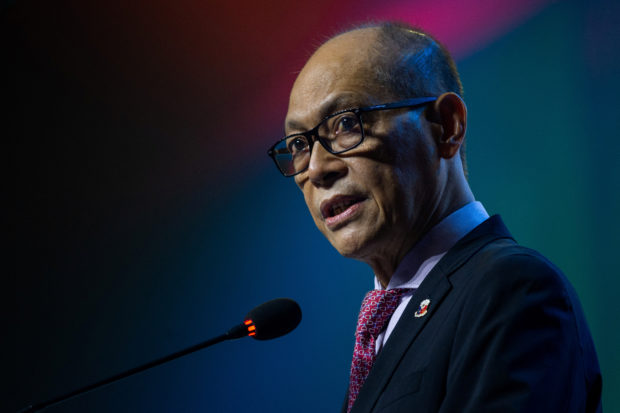DAVOS, Switzerland — The Philippines — one of the most mineral-rich countries in the world — plans to unlock potential gains from the reopening of the mining industry to help bankroll President Ferdinand Marcos Jr.’s plan to set up a sovereign wealth fund (SWF), similar to how oil-producing nations invest excess earnings for future generations.
This was disclosed by Finance Secretary Benjamin Diokno on Tuesday as the 18-member government delegation to the annual meetings of the World Economic Forum (WEF) started the international pitch for an SWF, to be called the Maharlika Investment Fund (MIF), whose enabling legislation breezed through the House of Representatives in December despite concerns from some lawmakers and private sector groups.
Diokno explained that the SWF concept was just “ordinary” in other countries that draw from such funds to support long-term investments, like how some Middle Eastern states deploy excess cash from their oil sales.
“Those kinds of assets are exhaustible so you need to set aside something for future generations,” he said.
Diokno said the country should have long ago used around $20 billion in earnings from the Malampaya gas field to jump-start such a fund, thereby benefiting future generations. This resource is now nearing depletion.
The finance chief said the Philippines would thus take its cue from other countries that have pursued the SWF path.
Seed money will come from a portion of dividends declared by state corporations every year, such as the Bangko Sentral ng Pilipinas, which pays out about P20 to P30 billion in dividends annually, Diokno said. Other corporations, such as the Philippine Amusement and Gaming Corp., could also contribute, he added.
Untapped reserves
“We reopened the mining industry after shutting it down for the last several years for environmental purposes. So our earnings from this exhaustible resource, we can put there so that the future generation could also benefit,” he said.
The Philippines is the fifth most mineralized country in the world with about $1 trillion worth of untapped copper, gold, nickel, zinc, and silver reserves. The local mining industry contributed P102.3 billion to the gross domestic product in 2020 despite the challenges posed by the COVID-19 pandemic, according to the Mines and Geosciences Bureau. Less than 5 percent of the country’s mineral reserves have been tapped.
Under the plan, the funds generated from mining would then be invested in many important projects in need of funding, including infrastructure projects that to date are mostly funded by borrowings from Japan, China, the World Bank and the Asian Development Bank, the finance chief said.
Such projects are vetted by the National Economic and Development Authority to make sure these are profitable and good for the economy, Diokno added.
“There won’t be any of those what you call white elephant projects,” he stressed.
‘Further devastation’
But the environmental organization Kalikasan PNE criticized the proposal to use mining proceeds for the sovereign wealth fund, saying that the Marcos administration would be “ignoring the social and environmental costs of the foreign and large-scale mining operations they are encouraging in the country.”
“We’ve seen how communities have been negatively affected by mining operations—the cases of Marcopper and OceanaGold are clear examples—and how communities are actively opposing mining across the country, such as in Sibuyan and Tampakan, on just grounds,” Jon Bonifacio, the group’s national coordinator, told the Inquirer.
“Until our mining industry puts the planet and the Filipino people first, something that can only take place after significant reforms in policy, this proposal of Sec. Diokno will only lead to further devastation for our country,” he added.
‘Our moment’
In his opening remarks at the Philippines Country Strategy Dialogue on Tuesday, Mr. Marcos noted that the process of establishing the country’s first-ever sovereign wealth fund was underway.
“Such a fund is one tool among many in our efforts to diversify our financial portfolio, which includes our existing institutions pursuing investment that will generate stable returns, but also welfare effects spanning employment creation, improvement of public service and a decrease in costs of economic activities,” he said.
Diokno said he was happy that during his first year in office, Mr. Marcos has been working hard to make investment pitches for the Philippines.
“And this is the biggest audience. This is our moment. We really have a nice story to tell and it’s just a matter of implementation so that we can improve the lives of Filipinos,” he added.
Supersized delegation
Back home, the supersized delegation accompanying the President to the WEF annual meetings in Davos has raised some concern. The official delegation headcount is 18, comprising Cabinet-level and senior officials but excluding support staff and private sector representatives.
Sen. Mark Villar, who served as public works secretary during the Duterte administration, said the proposed SWF would generate income and improve the country’s fiscal health.
“This is an investment and we have assets. The government also generates income but it’s not being maximized. So through the wealth fund, we can generate additional income and improve our fiscal situation,” Villar said.
Proponents of House Bill No. 6608, or the draft MIF Act, said the envisioned fund “adheres to the principles of good governance, transparency and accountability and shall be sourced from the investible funds of select government financial institutions, from contributions of the national government, declared dividends of the BSP and other sources of funds.”
The House measure has yet to have a counterpart bill in the Senate.
